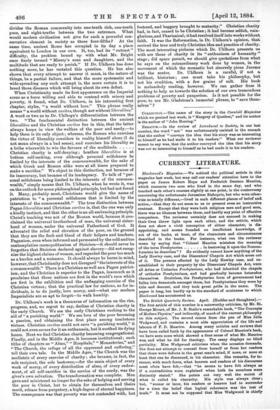CURRENT LITERATURE.
Blackwood's Magazine.—We noticed the political article in this magazine last week, but may call our readers' attention here to the paper on James Hobert Hope and Frederick Denison Maurice, which connects two men who lived in the same day, and who touched each other's courses slightly at one point, in the controversy concerning the unfortunate Jerusalem Bishopric, but who were other- wise so totally different,—lived in such different planes of belief and. action,—that they do not seem to us to present even an instructive contrast. Except that they were both religious men and good men, there was no likeness between them, and hardly any point of effective comparison. The reviewer certainly does not succeed in making their lives throw light upon each other, and the article, which does not show a vivid conception of either character, is dis- appointing, and seems founded on insufficient knowledge, if not of the books, at least, of the characters and circumstances described in the books. For instance, what can the reviewer mean by saying that "Colonel Maurice mistakes the meaning of the term Presbyterian in bestowing it upon the Noncon- formists he describes" ? He evidently cannot know anything of the Lady Hewley case, and the Dissenters' Chapels Act which arose out of it. The persons affected by the Lady Hewley case, and re- established in their property by the Dissenters' Chapels Act, were all Arian or Unitarian Presbyterians, who had inherited the chapels of orthodox Presbyterians, and had gradually become heterodox themselves. Doubtless, the Presbyterian form of government had fallen into desuetude amongst them, but Presbyterians they were by title and descent, and they took great pride in the name. The paper is long, but hardly up to the standard of acuteness to which Blackwood has accustomed us.


































 Previous page
Previous page